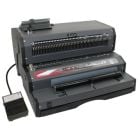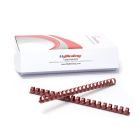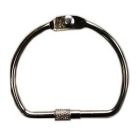How Binding Machines Work
If you are searching for a binding machine, you may be asking yourself how they work and how easy they are for beginners to operate. Here, we answer those questions and many more.
For the most part, all of the different binding machine methods employ two steps. First, there is a place, usually on the bottom of the machine, where you punch holes in your sheets, then there is a section up on the top or the side of the machine where the binding spines will be inserted. The exception to this tried and true method is thermal binding, wherein the finished product is a hardcover book, and no holes are punched, though sometimes pages are stapled together at the edges for added durability. The four main binding methods are as follows:
1. Plastic Comb. Like all of the methods discussed here, plastic comb binding is something you have seen hundreds if not thousands of times over the course of your life, but didn’t know what it was called. This method employs a plastic spine with comb-like teeth that hold the pages of your document together. In this method, your sheets are placed into the machine and using a lever, rectangular holes are punched into the edges of your document. Then, the plastic spine is placed into a row of stakes which, usually using the same lever that punched the holes, opens the comb binding up. Then the holes of the sheets are placed in line with the teeth of the comb, the lever is released and the teeth close around each other, binding your sheets together into a book.
2. Spiral Coil. Coil binding machines operate in a similar fashion, as least as far as the punching process is concerned. In this case the holes are usually round, and most machines are designated by the pitch at which they do their punching. Pitch is measured by the number of holes per inch, with a four holes per inch, or 4:1 pitch ratio being the most common. Once your holes are punched, a plastic wire resembling a spring is wound through the holes. Depending on the machine you purchase, you will either have a coil inserter attached, or will have to buy one separately. For smaller jobs, you can also opt to insert the coils by hand. In any event, you are strongly advised to purchase a wire crimper to finish the process.
3. Wire Binding. This method uses rectangular holes like comb binding, and a double-looped wire spine that closes and clamps together to keep the pages in place. This method provides a slightly more elegant look than the previous two, and you will often find it being used in art and photography books, as well as writer’s journals.
4. Thermal Binding. As previously mentioned, thermal binding is the one of these four styles that doesn’t employ a punching mechanism. In this method, your pages are simply placed inside your cover and placed in the machine. The thermal binding machine uses heat to melt a strip of glue that has been placed in the spine, the glue attaches the spine and the pages together and just like that, you have a hardcover or softcover book. This is the most elegant and permanent of all the binding methods, and is also one of the east expensive and easiest to complete.









